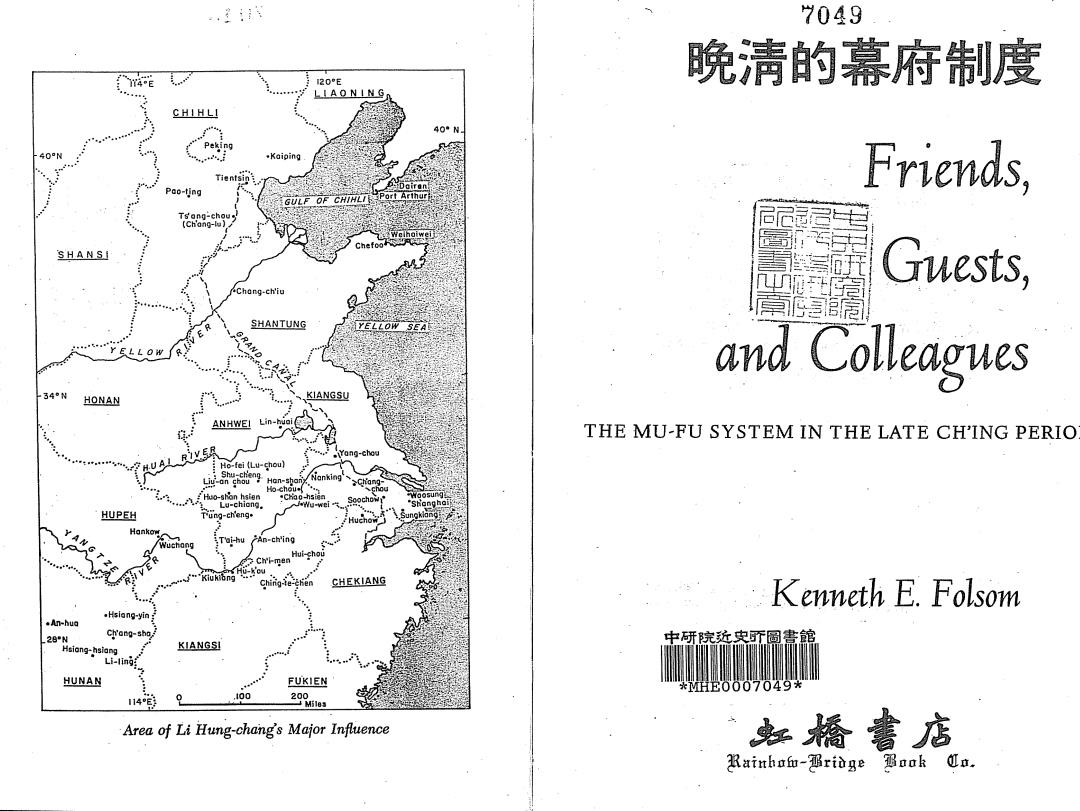
, 7049 晚清的幕府制度 W4-E 120E 4 LIAONING CHIHLI 40°N 40N Tientsin Pao-ting Deiran Friends, Che foo SHANSI Guests, Chang-ch'iu SHANTUNG ELLOW SEA 4L0了朵 and Colleagues 34°N HONAN KIANGSU ANHWEI L THE MU-FU SYSTEM IN THE LATE CH'ING PERIO ei (Lu-choul Liy-an chou Han-sh HUPEH 1g-cneng Han ai-hu ch'ino Chl-men Hur-ch ingte-ch CHEKIANG Kenneth E.Folsom .An-hua .Hsiang-yin 28 Ch'ang-sho 中开完史 Hsiang-hsiang KIANGSI Li-ling HUNAN FUKIEN 114官 100 Area of Li Hung-chang's Major Influence “好橋書店 airh立m-ridge图rtkt立
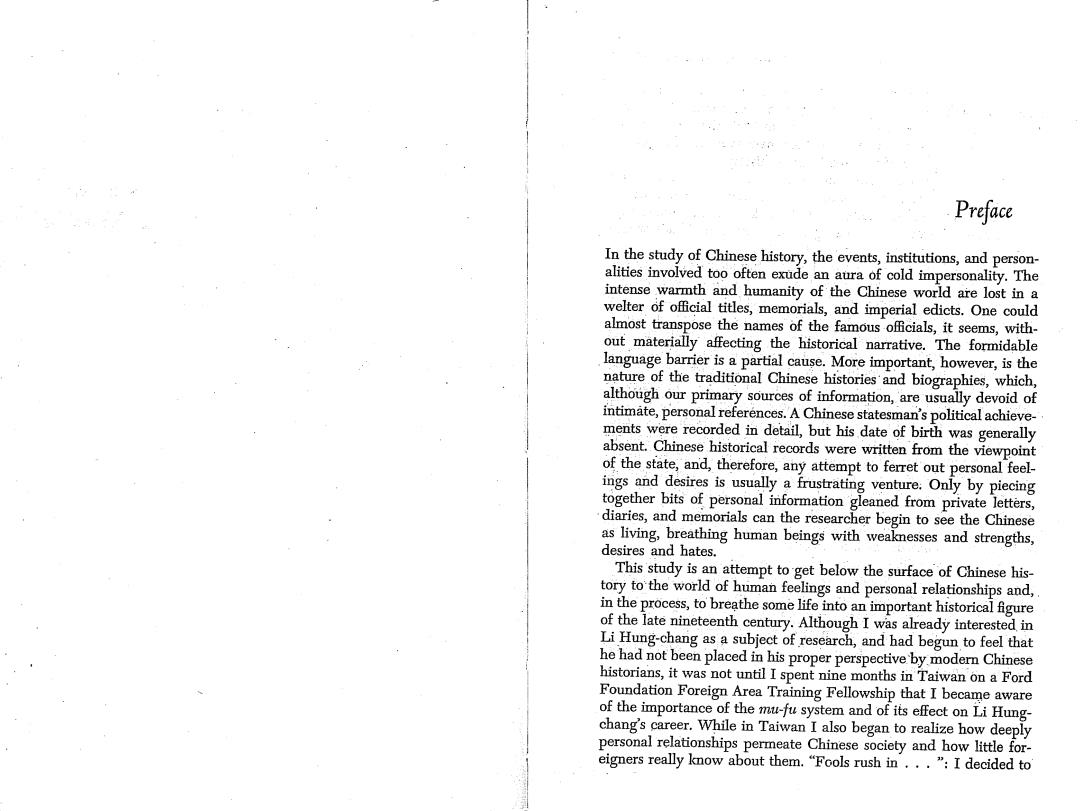
Preface In the study of Chinese history,the events,institutions,and person- alities involved too often exude an aura of cold impersonality.The intense warmth and humanity of the Chinese world are lost in a welter of official titles,memorials,and imperial edicts.One could almost transpose the names of the famous officials,it seems,with- out materially affecting the historical narrative.The formidable language barrier is a partial cause.More important,however,is the nature of the traditional Chinese histories and biographies,which, although our primary sources of information,are usually devoid of intimate,personal references.A Chinese statesman's political achieve- ments were recorded in detail,but his date of birth was generally absent.Chinese historical records were written from the viewpoint of the state,and,therefore,any attempt to ferret out personal feel- ings and desires is usually a frustrating venture.Only by piecing together bits of personal information gleaned from private letters, diaries,and memorials can the researcher begin to see the Chinese as living,breathing human beings with weaknesses and strengths, desires and hates. This study is an attempt to get below the surface of Chinese his- tory to the world of human feelings and personal relationships and, in the process,to breathe some life into an important historical figure of the late nineteenth century.Although I was already interested in Li Hung-chang as a subject of research,and had begun to feel that he had not been placed in his proper perspectiveby modern Chinese historians,it was not until I spent nine months in Taiwan on a Ford Foundation Foreign Area Training Fellowship that I became aware of the importance of the mu-fu system and of its effect on Li Hung- chang's career.While in Taiwan I also began to realize how deeply personal relationships permeate Chinese society and how little for- eigners really know about them."Fools rush in..."I decided to
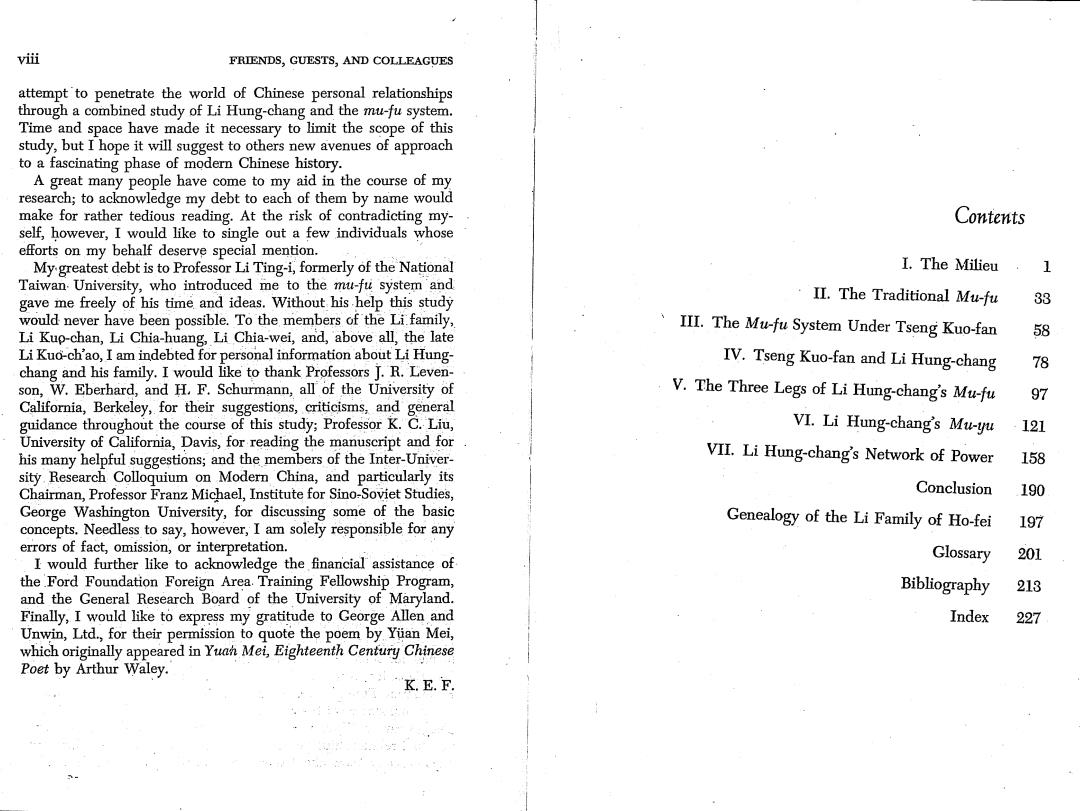
vi道 FRIENDS,GUESTS,AND COLLEAGUES attempt to penetrate the world of Chinese personal relationships through a combined study of Li Hung-chang and the mu-fu system. Time and space have made it necessary to limit the scope of this study,but I hope it will suggest to others new avenues of approach to a fascinating phase of modern Chinese history. A great many people have come to my aid in the course of my research;to acknowledge my debt to each of them by name would make for rather tedious reading.At the risk of contradicting my- Contents self,however,I would like to single out a few individuals whose efforts on my behalf deserve special mention. My greatest debt is to Professor Li Ting-i,formerly of the National I.The Milieu 1 Taiwan University,who introduced me to the mu-fu system and gave me freely of his time and ideas.Without his help this study II.The Traditional Mu-fu 33 would never have been possible.To the members of the Li.family, Li Kuo-chan,Li Chia-huang,Li Chia-wei,and,above all,the late III.The Mu-fu System Under Tseng Kuo-fan 58 Li Kuo-ch'ao,I am indebted for personal information about Li Hung- chang and his family.I would like to thank Professors J.R.Leven- IV.Tseng Kuo-fan and Li Hung-chang 78 son,W.Eberhard,and H.F.Schurmann,all of the University of V.The Three Legs of Li Hung-chang's Mu-fu 97 California,Berkeley,for their suggestions,criticisms,and general guidance throughout the course of this study;Professor K.C.Liu, VI.Li Hung-chang's Mu-yu 121 University of California,Davis,for reading the manuscript and for his many helpful suggestions;and the members of the Inter-Univer- VII.Li Hung-chang's Network of Power 158 sity.Research Colloquium on Modern China,and particularly its Chairman,Professor Franz Michael,Institute for Sino-Soviet Studies, Conclusion 190 George Washington University,for discussing some of the basic concepts.Needless to say,however,I am solely responsible for any Genealogy of the Li Family of Ho-fei 197 errors of fact,omission,or interpretation. I would further like to acknowledge the financial assistance of Glossary 201 the Ford Foundation Foreign Area.Training Fellowship Program, Bibliography 213 and the General Research Board of the University of Maryland. Finally,I would like to express my gratitude to George Allen and Index 227 Unwin,Ltd.,for their permission to quote the poem by Yuan Mei, which originally appeared in Yuah Mei,Eighteenth Century Chinese Poet by Arthur Waley. K.E.F
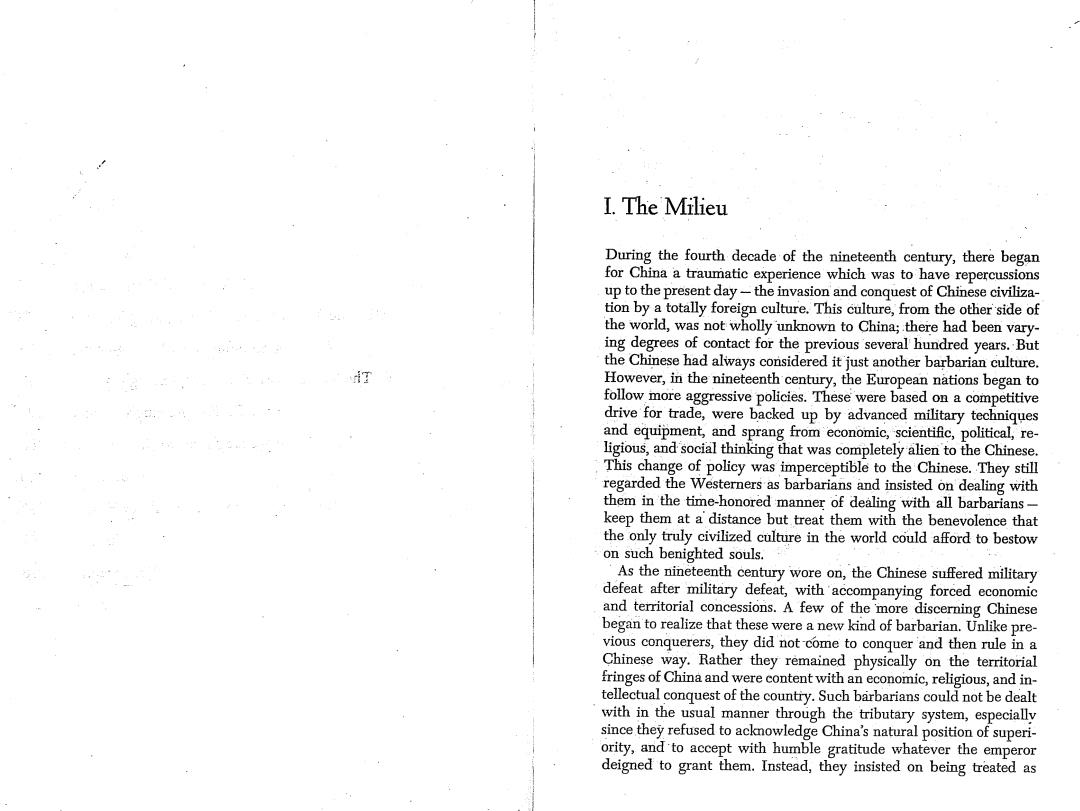
I.The Milieu During the fourth decade of the nineteenth century,there began for China a traumatic experience which was to have repercussions up to the present day-the invasion and conquest of Chinese civiliza- tion by a totally foreign culture.This culture,from the other side of the world,was not wholly unknown to China;there had been vary- ing degrees of contact for the previous several hundred years.But the Chinese had always considered it just another barbarian culture. ☒ However,in the nineteenth century,the European nations began to follow more aggressive policies.These were based on a competitive drive for trade,were backed up by advanced military techniques and equipment,and sprang from economic,scientifc,political,re- ligious,and social thinking that was completely alien to the Chinese. This change of policy was imperceptible to the Chinese.They still regarded the Westerners as barbarians and insisted on dealing with them in the time-honored manner of dealing with all barbarians- keep them at a distance but treat them with the benevolence that the only truly civilized culture in the world could afford to bestow on such benighted souls. As the nineteenth century wore on,the Chinese suffered military defeat after military defeat,with accompanying forced economic and territorial concessions.A few of the more discerning Chinese began to realize that these were a new kind of barbarian.Unlike pre- vious conquerers,they did not come to conquer and then rule in a Chinese way.Rather they remained physically on the territorial fringes of China and were content with an economic,religious,and in- tellectual conquest of the country.Such barbarians could not be dealt with in the usual manner through the tributary system,especiallv since they refused to acknowledge China's natural position of superi- ority,and to accept with humble gratitude whatever the emperor deigned to grant them.Instead,they insisted on being treated as
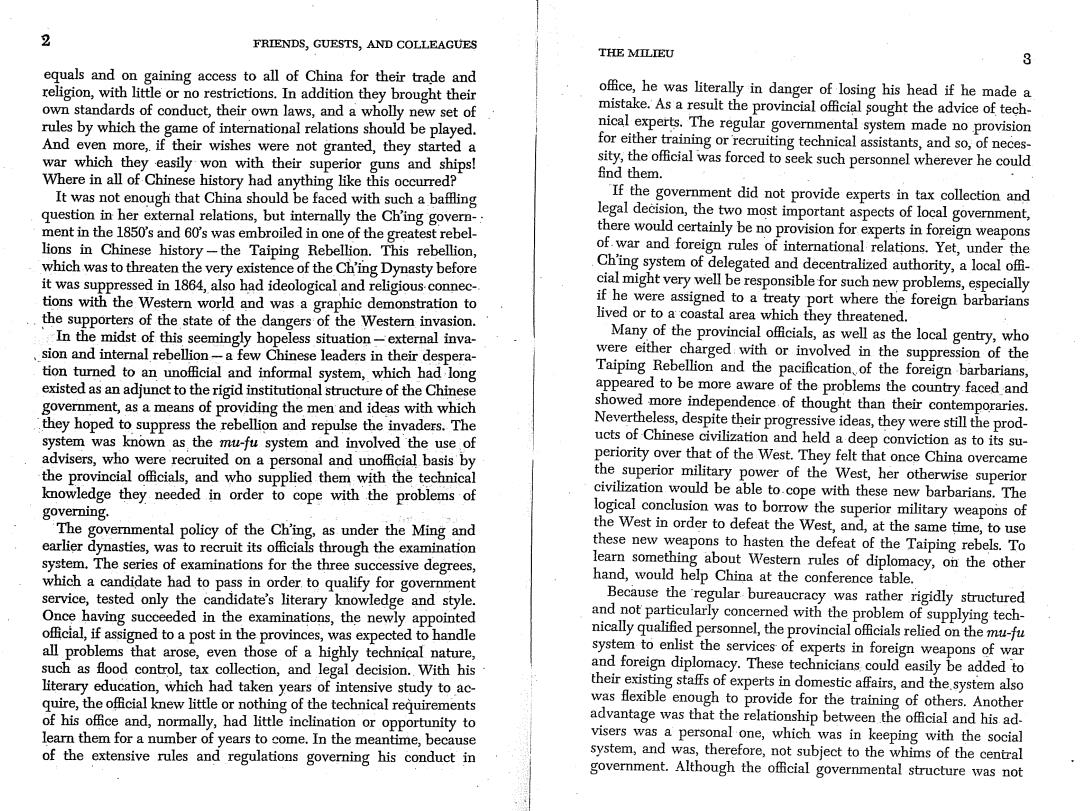
2 FRIENDS,GUESTS,AND COLLEAGUES THEMⅡIEU 3 equals and on gaining access to all of China for their trade and religion,with little or no restrictions.In addition they brought their office,he was literally in danger of losing his head if he made a own standards of conduct,their own laws,and a wholly new set of mistake.As a result the provincial official sought the advice of tech- rules by which the game of international relations should be played nical experts.The regular governmental system made no provision And even more,if their wishes were not granted,they started a for either training or recruiting technical assistants,and so,of neces- war which they easily won with their superior guns and ships! sity,the official was forced to seek such personnel wherever he could Where in all of Chinese history had anything like this occurred? find them. It was not enough that China should be faced with such a baffling If the government did not provide experts in tax collection and question in her external relations,but internally the Ch'ing govern- legal decision,the two most important aspects of local government, ment in the 1850's and 60's was embroiled in one of the greatest rebel- there would certainly be no provision for experts in foreign weapons lions in Chinese history-the Taiping Rebellion.This rebellion, of.war and foreign rules of international relations.Yet,under the which was to threaten the very existence of the Ch'ing Dynasty before Ch'ing system of delegated and decentralized authority,a local off- it was suppressed in 1864,also had ideological and religious.connec- cial might very well be responsible for such new problems,especially tions with the Western world and was a graphic demonstration to if he were assigned to a treaty port where the foreign barbarians the supporters of the state of the dangers of the Western invasion. lived or to a coastal area which they threatened. In the midst of this seemingly hopeless situation-external inva- Many of the provincial officials,as well as the local gentry,who sion and internal rebellion-a few Chinese leaders in their despera- were either charged with or involved in the suppression of the tion turned to an unofficial and informal system,which had long Taiping Rebellion and the pacification of the foreign barbarians, existed as an adjunct to the rigid institutional structure of the Chinese appeared to be more aware of the problems the country faced and government,as a means of providing the men and ideas with which showed more independence of thought than their contemporaries. they hoped to suppress the rebellion and repulse the invaders.The Nevertheless,despite their progressive ideas,they were still the prod- system was known as the mu-fu system and involved the use of ucts of Chinese civilization and held a deep conviction as to its su- advisers,who were recruited on a personal and unofficial basis by periority over that of the West.They felt that once China overcame the provincial officials,and who supplied them with the technical the superior military power of the West,her otherwise superior knowledge they needed in order to cope with the problems of civilization would be able to.cope with these new barbarians.The governing. logical conclusion was to borrow the superior military weapons of The governmental policy of the Ch'ing,as under the Ming and the West in order to defeat the West,and,at the same time,to use earlier dynasties,was to recruit its officials through the examination these new weapons to hasten the defeat of the Taiping rebels.To system.The series of examinations for the three successive degrees, learn something about Western rules of diplomacy,on the other which a candidate had to pass in order to qualify for government hand,would help China at the conference table. service,tested only the candidate's literary knowledge and style. Because the regular bureaucracy was rather rigidly structured Once having succeeded in the examinations,the newly appointed and not particularly concerned with the problem of supplying tech- official,if assigned to a post in the provinces,was expected to handle nically qualified personnel,the provincial officials relied on the mu-fu all problems that arose,even those of a highly technical nature, system to enlist the services of experts in foreign weapons of war such as flood control,tax collection,and legal decision..With his and foreign diplomacy.These technicians could easily be added to literary education,which had taken years of intensive study to ac- their existing staffs of experts in domestic affairs,and the system also quire,the official knew little or nothing of the technical requirements was flexible enough to provide for the training of others.Another of his office and,normally,had little inclination or opportunity to advantage was that the relationship between the official and his ad. learn them for a number of years to come.In the meantime,because visers was a personal one,which was in keeping with the social of the extensive rules and regulations governing his conduct in system,and was,therefore,not subject to the whims of the central government.Although the official governmental structure was not